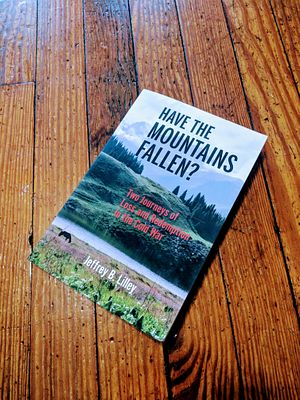In 1988, Chingiz Aitmatov signed a copy of his 1980 novel The Day Lasts More than a Hundred Years for Azamat Altay. “I dedicate this to Abutalip, who is alive,” Aitmatov wrote, “and he is Azamat Altay.”
Like Altay, the character Abutalip in The Day had fought for the Soviet Union in World War II and had been captured by Germans. Both the man and the character escaped and joined local partisans, fighting the Nazis from the other side. After the war, the character returned to his homeland burdened by the Soviet’s state’s crushing suspicions. But the man, Altay, did not return home — not for 55 years — and was labeled a traitor by his homeland for much of his life.
The stories of Chingiz Aitmatov and Azamat Altay are best told together, a herculean task which Jeffrey B. Lilley’s Have The Mountain’s Fallen? Two Journeys of Loss and Redemption in the Cold War manages deftly. The lives of the two men — Aitmatov and Altay — seem intertwined all along, despite the fact that they did not meet face-to-face until 1975. For much of their lives, Aitmatov and Altay stood on opposite sides of the Cold War. Their story — because it is, in essence, a single story — is that of Kyrgyzstan itself, replete with tragedy and sacrifice, hope and triumph. “This is the story of the survival of a small people surrounded by bigger, often hostile powers,” Lilley writes early in the book, launching into a brief but critical review of the history of the Kyrgyz and the fathers whose lives fundamentally impacted those of their sons: Aitmatov and Altay.
Chingiz Aitmatov, born in a small Kyrgyz village in 1928, is Kyrgyzstan’s most famous author. His statue stands opposite the plaza where once Lenin stood in Bishkek, since replaced by a statue of Manas, the hero of Kyrgyzstan’s national epic. Aitmatov’s father was a victim of Stalin’s purges in 1938, disappearing when Chingiz was 10 years old and remaining missing until his bones were found in a mass grave in 1991. The child of an “enemy of the people,” Aitmatov grew up well aware of the Soviet state’s cruelties. But his career stands as a testament to survival within a totalitarian state. His written works were subtly subversive, but he trod his life’s path carefully as a loyal Soviet citizen. Eleven when World War II broke out, among Aitmatov’s tasks in his village — then emptied of fighting-age men — was delivering official death notices to his neighbors.
Azamat Altay, born Kudaibergen Kodjomberdiev in 1920, on the other hand, was 19 when World War II broke out and in 1940 was drafted into the Soviet Army. Altay was posted along the Lithuanian border when, on June 22, 1941, Germany launched its invasion of the Soviet Union. Altay was captured in late August that year and in the subsequent years escaped Nazi prison camps three times and found his way to the West, ultimately fighting alongside French partisans when Paris was liberated in August 1944. On his way back to the Soviet Union, however, Altay noticed as conditions deteriorated. Celebratory banners were torn from the repatriation trains and Soviet soldiers guarded, rather than greeted, their former comrades. Working as a clerk in a repatriation camp, Altay met an older Kyrgyz man who knew him. “It is better for you to not return home. If you return home it will be very difficult for you,” the man told Altay. Altay escaped to the West, eventually coming into a notable career as a broadcaster for Radio Liberty’s Kyrgyz Service. His voice reached the homeland he would not set foot in until 1995, and where his name had long been smeared as that of a traitor.
Lilley’s book is no hagiography, however, and is better for its honest depiction of the two Kyrgyz heroes. It shows its subjects as they were, imperfect men fighting for what freedom they could in an imperfect and often unjust world. Aitmatov, for example, was among 31 Soviet writers in 1973 to sign an open letter denouncing Andrei Sakharov, a nuclear scientist-turned-dissident advocating for human rights, disarmament, and cooperation (for which he won the 1975 Nobel Peace Prize). As Lilley notes, Aitmatov was likely pressured to sign; “[i]n the trade-off of surviving as a progressive writer in the Soviet Union, Chingiz Aitmatov had sold a bit of himself.” Altay, meanwhile, had a hot temper and perhaps due to stark cultural differences, had difficulty working alongside (and for) women in the New York Public Library and at Columbia University’s Butler Library in the 1960s and ’70s.
Kyrgyzstan, which has long honored Aitmatov, should similarly cherish Altay. In the early 1990s, another Kyrgyz writer, Beksultan Jakiev, urged Altay to return to independent Kyrgyzstan. But Altay was weary and wary, “I am homesick, but I will never return… The smear campaigns have left a bad taste in my mouth.” Jakiev began telling Altay’s story and in 1995, Altay finally returned to Kyrgyzstan.
Lilley, in closing the book’s epilogue, calls Aitmatov and Altay “beacons to guide those willing to bear a price to be free.” Altay paid a heavy price for freedom — 55 years away from his homeland. Aitmatov also paid a price; truncated freedom was perhaps better than none at all, but it was not without sacrifice. “They are examples of courage to the current generation and, hopefully, generations to come,” Lilley writes. “They fought the fight against impressive odds. Now it’s up to their countrymen to carry on. After all, nomads were never content with being contained.”
Have The Mountain’s Fallen? Two Journeys of Loss and Redemption in the Cold War is available in English from Indiana University Press. The author is working on raising funds to have the book translated into Russian and Kyrgyz, information about that effort and on donating is available here.
































